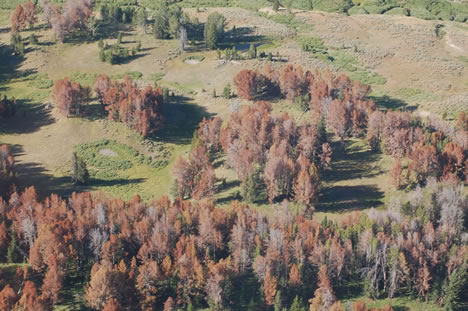|
 Dr. Diana Tomback writes: My area of expertise is forest ecology. For my doctoral work, I discovered that whitebark pine, a widely distributed high elevation pine, depends on a bird, the Clark's nutcracker, for seed dispersal. My students and I work at the plant-animal interface, studying both the behavior and ecology of nutcrackers and the ecology and population biology of the pines that they disperse, and more recently the decline of the whitebark pine-nutcracker interaction. The setting for this research has been the most iconic high elevation places in the U.S. and Canada, including Rocky Mountain, Yosemite, Crater Lake, Glacier, Yellowstone, and Grand Teton National Parks, various national forests in Montana and Wyoming, the Bob Marshall Wilderness Area, and Waterton Lakes, Banff, and Kootenay National Parks in Canada. Our most recent research settings are treeline ecosystems in Glacier National Park and on Blackfeet Tribal Lands, MT, and also on the Beartooth Plateau north of Yellowstone. My research has been funded by the U.S. Forest Service, National Park Service, National Science Foundation, and Global Forest Science. Dr. Diana Tomback writes: My area of expertise is forest ecology. For my doctoral work, I discovered that whitebark pine, a widely distributed high elevation pine, depends on a bird, the Clark's nutcracker, for seed dispersal. My students and I work at the plant-animal interface, studying both the behavior and ecology of nutcrackers and the ecology and population biology of the pines that they disperse, and more recently the decline of the whitebark pine-nutcracker interaction. The setting for this research has been the most iconic high elevation places in the U.S. and Canada, including Rocky Mountain, Yosemite, Crater Lake, Glacier, Yellowstone, and Grand Teton National Parks, various national forests in Montana and Wyoming, the Bob Marshall Wilderness Area, and Waterton Lakes, Banff, and Kootenay National Parks in Canada. Our most recent research settings are treeline ecosystems in Glacier National Park and on Blackfeet Tribal Lands, MT, and also on the Beartooth Plateau north of Yellowstone. My research has been funded by the U.S. Forest Service, National Park Service, National Science Foundation, and Global Forest Science.
Information on whitebark pine ecology has become particularly valuable as a result of major population losses in this tree. These losses result from introduced disease--white pine blister rust—as well as recent, widespread outbreaks of a native forest pest, mountain pine beetles, coupled with fire exclusion in some regions. Climate change is also expected to alter whitebark pine distributions greatly. Several colleagues and I started a non-profit organization, the Whitebark Pine Ecosystem Foundation, which is dedicated to the restoration of whitebark pine ecosystems and educating the public and resource management agencies about the importance of this pine. I have served as volunteer Director of this organization since it began in 2001. Whitebark pine is considered both a foundation and keystone species for high-elevation ecosystems: its loss will greatly diminish western biodiversity.
Dr. Tomback has BA and MA degrees in Zoology from UCLA, and her PhD, in Biological Sciences, is from the University of California at Santa Barbara. |

 Dr. Diana Tomback writes: My area of expertise is forest ecology. For my doctoral work, I discovered that whitebark pine, a widely distributed high elevation pine, depends on a bird, the Clark's nutcracker, for seed dispersal. My students and I work at the plant-animal interface, studying both the behavior and ecology of nutcrackers and the ecology and population biology of the pines that they disperse, and more recently the decline of the whitebark pine-nutcracker interaction. The setting for this research has been the most iconic high elevation places in the U.S. and Canada, including Rocky Mountain, Yosemite, Crater Lake, Glacier, Yellowstone, and Grand Teton National Parks, various national forests in Montana and Wyoming, the Bob Marshall Wilderness Area, and Waterton Lakes, Banff, and Kootenay National Parks in Canada. Our most recent research settings are treeline ecosystems in Glacier National Park and on Blackfeet Tribal Lands, MT, and also on the Beartooth Plateau north of Yellowstone. My research has been funded by the U.S. Forest Service, National Park Service, National Science Foundation, and Global Forest Science.
Dr. Diana Tomback writes: My area of expertise is forest ecology. For my doctoral work, I discovered that whitebark pine, a widely distributed high elevation pine, depends on a bird, the Clark's nutcracker, for seed dispersal. My students and I work at the plant-animal interface, studying both the behavior and ecology of nutcrackers and the ecology and population biology of the pines that they disperse, and more recently the decline of the whitebark pine-nutcracker interaction. The setting for this research has been the most iconic high elevation places in the U.S. and Canada, including Rocky Mountain, Yosemite, Crater Lake, Glacier, Yellowstone, and Grand Teton National Parks, various national forests in Montana and Wyoming, the Bob Marshall Wilderness Area, and Waterton Lakes, Banff, and Kootenay National Parks in Canada. Our most recent research settings are treeline ecosystems in Glacier National Park and on Blackfeet Tribal Lands, MT, and also on the Beartooth Plateau north of Yellowstone. My research has been funded by the U.S. Forest Service, National Park Service, National Science Foundation, and Global Forest Science.  The talk and discussion at Café Scientifique will center around the massive outbreaks of mountain pine beetles in Colorado, and across the West and other problems faced by our western forests. The mountain pine beetle is a native bark beetle that historically has gone into outbreak mode during periods of warmer temperatures and drought, providing a natural disturbance factor for forests and resetting ecological succession. This current outbreak is considered "unprecedented" in scale and scope. What has caused this? Why unprecedented? Do beetle-killed trees pose any long-term danger? Will the forest come back? What about "beyond the beetles"—what is on the horizon for our mountain forests?
The talk and discussion at Café Scientifique will center around the massive outbreaks of mountain pine beetles in Colorado, and across the West and other problems faced by our western forests. The mountain pine beetle is a native bark beetle that historically has gone into outbreak mode during periods of warmer temperatures and drought, providing a natural disturbance factor for forests and resetting ecological succession. This current outbreak is considered "unprecedented" in scale and scope. What has caused this? Why unprecedented? Do beetle-killed trees pose any long-term danger? Will the forest come back? What about "beyond the beetles"—what is on the horizon for our mountain forests?